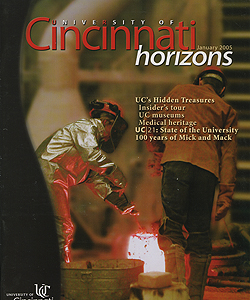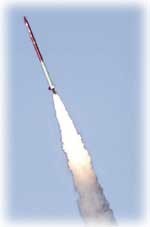Genetic link to lung cancer
University of Cincinnati scientist Marshall Anderson has uncovered evidence that may lead to the actual gene that predisposes a family to lung cancer. Anderson and collaborator Susan Pinney, also of UC, led a national research consortium that announced last July it had made a major breakthrough in the fight against the leading cause of cancer death in the United States.
This is the first suggestion that lung cancer, long tied to cigarette smoking and other external causes, might also be an inherited disease. It may also help explain why some people get lung cancer even if they never smoked.
“The discovery of genes for other types of cancer has led to better understanding of those diseases, which in turn can lead to better strategies for treatment and prevention,” says Anderson. “We hope that uncovering a gene or genes responsible for lung cancer will do the same for this devastating disease.”
Researchers have traced the gene to a narrow genetic region, but once the actual culprit is unveiled, doctors will be able to determine whether a family has a bad gene, then tell those who carry it to take precautions, he says.
“We’re confident the gene is there,” Anderson says. “We’ve seen evidence with every analytical model we’ve used. We’ll find it.”
News release about possible lung cancer gene
UC Center for Genome Information
UC researcher wins “American Nobel”
Last fall, UC scientist Elwood Jensen won a Lasker Award, the nation’s highest honor for medical research and often a precursor to the Nobel Prize, for his pioneering breast cancer research. Historically, Ohio has had only one other Lasker winner -- UC researcher Albert Sabin, who developed the oral polio vaccine at UC in the ‘50s.
It was also in the 1950s, at the University of Chicago, that Jensen discovered some breast tumors have receptors for estrogen and others do not, a discovery that revolutionized breast cancer treatment and now saves and/or prolongs the lives of more than 100,000 women yearly. Jensen is a visiting professor at the Vontz Center for Molecular Studies today.
The Lasker Award is widely known as “America’s Nobel” because nomination and selection processes are equally rigorous as those for the Nobel Prize, with judges who are the world’s top scientists. Many Lasker recipients have gone on to receive the Nobel Prize.

 Past Issues
Past Issues




